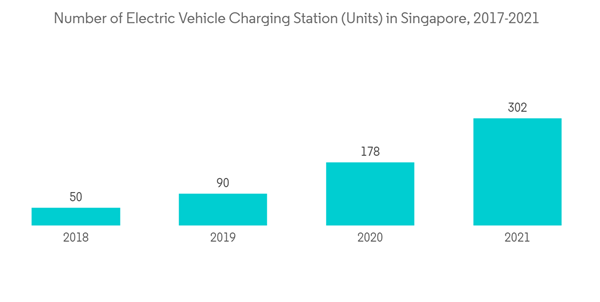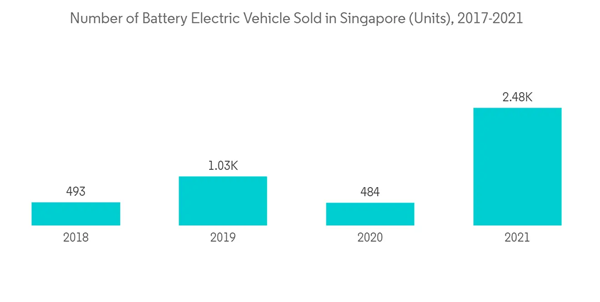As a result of the COVID-19 pandemic, manufacturing activities ceased for several months in the first half of 2020. Also, the disrupted supply chain and the shortage of chips in 2021 hurt the market's growth. However, the automotive industry is now recovering from the losses and paving the way to introduce quality products to cater to the rising demand from consumers across the country. The automotive industry witnessed significant growth in terms of production in 2021, which is likely to increase the demand for electric vehicles across the country.
Over the medium term, Government policies to support the growth of electric vehicles and plans to enlarge the electric vehicle charging infrastructure are expected to remain prominent market drivers during the forecast period. Singapore is leading the EV charging infrastructure with 1,800 public charging outlets accessible across the country and plans to add 60,000 charging sites by 2030.
Singapore government promotes vehicle manufacturers for vehicle electrification; there must be usage and purchase incentives that either lower the overall cost of ownership or make driving electric vehicles more convenient for customers. The government announced that new electric vehicles and taxis registered between 1 January 2021 and 31 December 2023 would receive a 45% rebate off the additional registration fees (ARF) tax. Such incentive helps to enhance the sale of electric vehicles across the country during the forecast period.
Singapore Electric Vehicle Market Trends
Growing charging infrastructure across the country
Singapore has been at the forefront of EV charging infrastructure, with more than 1,800 public charging points available. The Government of Singapore plans to install 60,000 more charging points by the end of 2030; such an increase in charging infrastructure across the country is likely to promote the sale of electric vehicles across the country.The government of Singapore has allocated USD 22 million for initiatives to boost electric vehicle adoption Between 2021 and 2025 and increase the reach of chargers on private property. Simultaneously, Singapore has effectively established itself as the region's EV industry's R&D epicenter by allowing investments from conglomerates and start-ups to construct a strong regional EV ecosystem.
To support the adoption of electric vehicles across the country, the Singapore Ministry of Transport has adopted a three-pronged approach through tax incentives, regulations, standards, and EV charger deployment. Under this approach, the government provides early adoption of electric vehicle incentives up to 45% of a tax incentive on new electric vehicle purchases.
In September 2021, Urban Redevelopment Authority (URA) and Land Transport Authority (LTA) awarded the pilot tender for more than 600 EV charging points in over 200 public car parks across Singapore.
Enactment of regulations for the installation of chargers in new building parking spaces across the country is likely to increase the charging infrastructure across the country, which in turn is expected to enhance the sale of electric vehicles during the forecast period.
In June 2022, the government of Singapore proposed laws to regulate electric vehicle charging in Singapore. Under this proposal, all new buildings with carparks must install electric vehicle charging points in at least 1 percent of their total car and motorcycle parking space.
Such Instances are an evident sign that electric vehicle in Singapore has an ace up its sleeve to shift over to sustainable energy transportation, which could be an evident sign of growth during the forecast period.
Rise In Sale of Battery Electric Vehicles
Electric mobility is swiftly growing worldwide, owing to which goods transportation companies are also converting their existing fleet into electric propulsion-based vehicles.The growing consumer preference for fuel-efficient Electric Vehicles (EVs), self-driving cars, and vehicle-to-vehicle communication technology are expected to boost market growth over the forecast period.
Furthermore, regulatory bodies have laid down stringent regulations about bringing down fuel emissions and increasing road safety. This has brought the complete automotive industry to resonate the same effect in adopting the EV segment for its growing automotive fleet across the country. For instance,
By 2040, Singapore has planned to phase out its all-internal combustion engines and replace them with cleaner energy vehicles. The newly founded National Electric Vehicle Centre (NEVC) is heading the campaign to promote wider EV adoption, with Singapore's objective for all vehicles to run on greener energy by 2040. This enables Singapore to develop new EV-related technologies safely and innovatively.
Key automakers with robust infrastructure layouts and manufacturing capabilities have laid this transition historically, thus enabling the strong potential for growth of BEV during the 2022-2027 forecast period. Several vehicle manufacturers are introducing new electric vehicle models in the country, which in turn is likely to witness major growth for the market during the forecast period. For instance,
- June 2022: In Singapore, BYD unveiled the ATTO 3 SUV. Under the direction of BYD's lead designer Wolfgang Egger, the new model follows BYD's Dragon Face 3.0 design language with a sporty-themed interior design specifically created for youthful clients. The new vehicle measures 4455/1875/1615mm in length and 2720mm in width. The vehicle is powered by a basic 150kW motor that accelerates from 0 to 100 km/h in 7.3 seconds. On a single charge, the EV has a range of 480 kilometers.
- February 2022: Audi launched e-Tron S Sportback electric SUV in Singapore. E-Tron S Sportback has 496hp and 973Nm of torque and has a range of up to 360km on a single charge.
Based on the factors above, growing investments in electric vehicle manufacturing are likely to increase the demand for battery electric vehicles across the country.
Singapore Electric Vehicle Market Competitor Analysis
Singapore Electric Vehicle Market is dominated by several key players, including Hyundai Motor, Tesla Inc., BMW Group, MG Motors, and Volvo Group. Several vehicle manufacturers are investing in the country to enhance electric vehicle sales during the forecast period. For instance,- December 2022: Renault Singapore announced it would transition to full electrification, with the first model in the company's Electric Vehicle (EV) lineup set to debut in 2023. The move is in line with Renault's global directive to expand its electric mobility offerings, as well as Singapore's Green Plan 2030.
- January 2022: Hyundai Motor Company invested USD 295 Million to develop the new Hyundai Motor Group Innovation Center (HMGICS) in Singapore features an electric car factory with targeted production of 30,000 electric vehicles by 2025.
Additional benefits of purchasing the report:
- The market estimate (ME) sheet in Excel format
- 3 months of analyst support
This product will be delivered within 2 business days.
Table of Contents
Companies Mentioned (Partial List)
A selection of companies mentioned in this report includes, but is not limited to:
- BMW AG
- Toyota Motor Corporation
- Tesla Inc.
- AB Volvo
- MG Motor
- Nissan Motor Company
- BYD Co. Ltd
- Hyundai Motor Company
- Mitsubishi Motor Corporation
- Audi AG
- Mercedes-Benz Group AG










